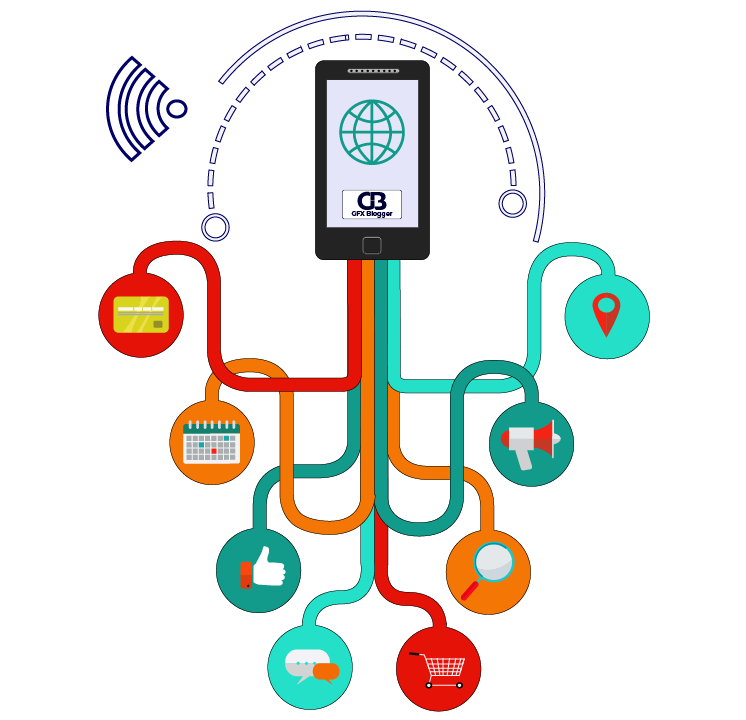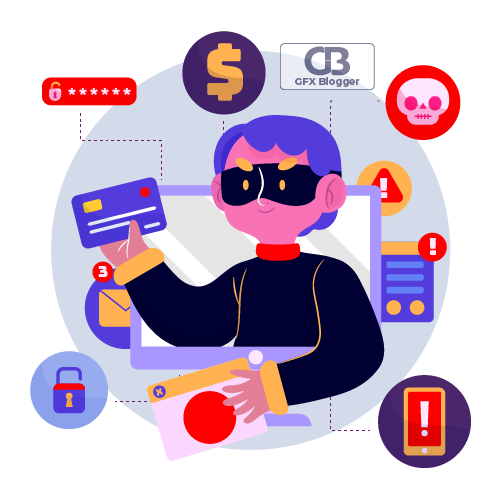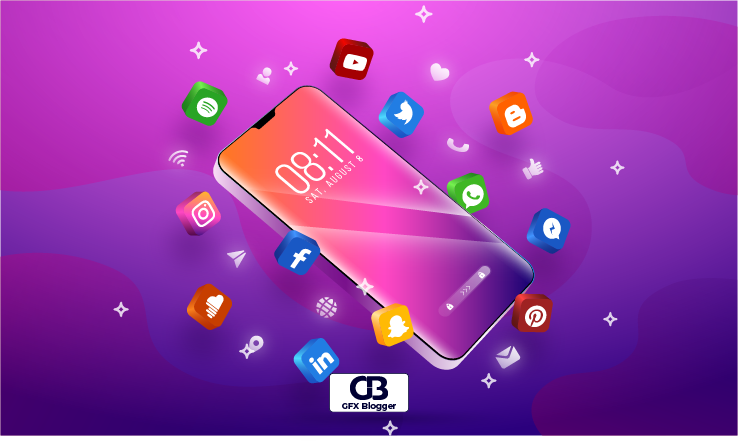What is a Mobile App?
A mobile app, short for application, is a software program designed to run on a mobile device such as a smartphone or tablet. These apps can download from app stores such as the Apple App Store or Google Play Store, and range in functionality from games to productivity tools.
Connectivity and Organization through Mobile Apps:
One of the most significant impacts of mobile apps is on our ability to stay connected. Social media apps such as Facebook, Instagram, and Twitter have made it easier than ever to keep in touch with friends and family, no matter where they are in the world. Additionally, messaging apps such as WhatsApp and Telegram have made it possible to communicate with people in real-time without incurring the cost of international phone calls.

Mobile apps have also made it easier for people to stay organized and manage their daily tasks. Calendar and to-do list apps such as Google Calendar and To-do list help users keep track of important events and deadlines. While note-taking apps such as Evernote and OneNote allow users to capture ideas and information on the go.
Impact on Information Consumption and Access:
Another impact of mobile apps is on the way we consume and access information. News apps such as the New York Times and CNN provide users with access to the latest news and updates. While weather apps like AccuWeather and Weather Underground provide real-time weather updates. Additionally, educational apps such as Duolingo, Udemy, and Khan Academy have made it possible for people to learn new skills and gain knowledge on a wide range of subjects.
Mobile apps have also had a significant impact on the way we shop. Online shopping apps (Amazon, Walmart, and Target) have made it possible for people to purchase goods from their comfort. While food delivery apps like Grubhub and Uber Eats have made it possible for people to order food from their favorite restaurants without leaving their homes.
Impact of Mobile Apps on Navigation and Privacy Concerns:
-
Navigation:
Mobile apps have also had a significant impact on the way we get around. Maps and navigation apps e.g., Google Maps and Waze have made it easier for people to find their way around unfamiliar places. While ride-hailing apps like Uber and Lyft have made it possible for people to easily hail a ride from anywhere.
-
Privacy Concerns:
However, mobile apps also have their downsides. One of the main concerns is the amount of personal data that these apps collect and how it is being used. Many apps require access to personal information such as location data, contacts, and browsing history in order to function, and there is a growing concern about how this data is being used and shared. Additionally, there is also concern about the time people spend on their mobile devices and the impact it is having on their mental and physical health.

-
Making the Most of Mobile Apps:
To ensure that you are getting the most out of your mobile apps, it’s important to be selective about the apps you download and use. Not all apps are created equal, and it’s essential to do your research and read reviews before downloading an app. Additionally, it’s critical to be mindful of the permissions that apps are requesting and only grants access to the information that is truly necessary for the app to function.
The Rise of Mobile Apps and their Impact on Society:
In the past decade, mobile apps have become an integral part of our lives. From ordering food and booking a ride to managing our finances and tracking our fitness, there’s an app for nearly everything. But how did we get here, and what impact are these apps having on our society?
The use of mobile apps has also led to an increase in screen time and a decrease in face-to-face interaction, impacting social skills and relationships. Additionally, the constant access to information and distractions has made it harder for people to focus and be present in the moment. Despite these challenges, the rise of mobile apps continues to shape our society and how we live, work, and play.
The Emergence of Mobile Apps:
The first mobile apps appeared in the late 2000s, shortly after the launch of the iPhone and the introduction of the App Store. At first, apps were primarily used for simple tasks like checking the weather or playing games. But as smartphones became more powerful and ubiquitous, app developers began to explore new ways to use the technology.
Impact of Mobile Apps on Shopping Habits:
One of the most significant changes brought about by mobile apps is the way we shop. Online shopping has been around for decades, but the convenience of being able to order goods and services from our phones has made it more popular than ever. From ordering groceries for delivery to booking a hotel room, apps have made shopping more convenient and accessible than ever before.
The Impact of Mobile Apps on Transportation and Communication:
-
Revolutionizing Transportation:
Another area where mobile apps have had a major impact is transportation. Ride-sharing apps like Uber and Lyft have revolutionized the way we get around, making it easier and more affordable to hail a ride. Additionally, public transportation apps have made it easier to plan trips and purchase tickets, making it more convenient for people to use public transit.
-
Staying Connected with Friends and Family:
Mobile apps are also changing the way we stay connected with friends and family. Social media apps like Facebook and Instagram have made it easier to share photos and updates with loved ones. While messaging apps like WhatsApp and iMessage have made keeping in touch with friends and family. Additionally, video conferencing apps like Zoom and Google Meet have made it possible to hold meetings and stay connected with co-workers from anywhere in the world.
-
Transforming Business Operations:
In addition to these consumer-facing apps, mobile apps are also having a major impact on the way businesses operate. From sales and marketing to logistics and operations, companies are using mobile apps to streamline their processes and improve their bottom line. For example, field service companies are using mobile apps to schedule and track appointments. While retailers are using apps to manage inventory and process sales.
Accessing Information and Knowledge through Mobile Apps:
-
Mobile Apps for Information and Knowledge:
Mobile apps simplify access to information and knowledge. Educational apps teach coding and language. News apps provide current event updates. Healthcare providers offer telemedicine services through apps, improving access to healthcare information and services. The convenience and accessibility of these apps have made learning and staying informed easier than ever.
-
Convenience and Accessibility of Mobile Apps:
For instance, educational apps make it possible to learn new skills from the comfort of one’s own home. News apps keep people updated with the latest events, eliminating the need to regularly check different news sources. Telemedicine services through healthcare apps allow individuals to receive medical consultations and advice from their homes.
-
The Revolutionizing Impact of Mobile Apps:
The impact of mobile apps on our lives cannot be overstated. They have revolutionized the way we access information, learn new skills, stay informed, and receive healthcare services. The future promises even more innovative and useful apps that will continue to change our lives for the better.
The Pros and Cons of Mobile Apps:
-
Challenges of Mobile Apps:
While mobile apps have brought many benefits, they have also created some challenges. One of the most significant concerns is privacy and security. As we increasingly rely on apps to manage our personal information, it’s more important than ever to ensure that our data is protected. Additionally, with so many apps available, it can be difficult for users to know which apps are trustworthy and which are not.
-
Benefits of Mobile Apps:
Another challenge is the time we spend on our devices. With so many apps available, it’s easy to become addicted to our phones and spend hours on them each day. This can have a negative impact on our physical and mental health, as well as our relationships and productivity.
Despite these challenges, the rise of mobile apps has brought many benefits and has changed the way we live and work. From shopping and transportation to social connection and access to information, mobile apps have made many aspects of our lives more convenient and accessible.
-
The Future of Mobile Apps:
As technology continues to evolve, we can expect to see even more innovative and creative uses of mobile apps in the future. They will play a crucial role in the digital transformation of industries and bring new opportunities for businesses to reach and engage with customers. Additionally, mobile apps will also bring more opportunities for education, healthcare, and entertainment. With the increasing capabilities of mobile devices and advancements in artificial intelligence, the potential for mobile apps to make a positive impact on our lives is virtually unlimited.

Final Words:
In conclusion, mobile apps have had a significant impact on our daily lives, making it easier to stay connected, stay organized, and access information and services. From communication and entertainment to productivity and healthcare, mobile apps have transformed the way we interact with technology. The rise of mobile app development has also created new opportunities for businesses and entrepreneurs to reach customers and expand their reach. The demand for mobile apps is getting higher, as more people turn to their smartphones for convenience, efficiency, and accessibility. The future of apps looks bright, and it will be interesting to see how they continue to shape and enhance our daily lives.




























































Highly Researched work.
Thank you for taking the time to read my blog on the power of mobile apps and leaving a comment! As the writer of the article, I’m glad to hear that you found the information on how mobile apps are revolutionizing our lives useful and insightful. Mobile apps have changed the way we communicate, work, and entertain ourselves, and their impact is only continuing to grow. I hope the examples and statistics I provided helped illustrate the importance of mobile apps in our daily lives, and encouraged readers to explore the possibilities that apps offer. Please feel free to reach out if you have any further questions or suggestions for future articles. Thanks again for your feedback!